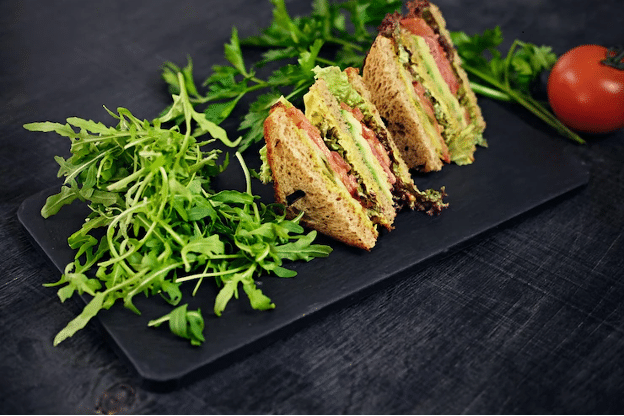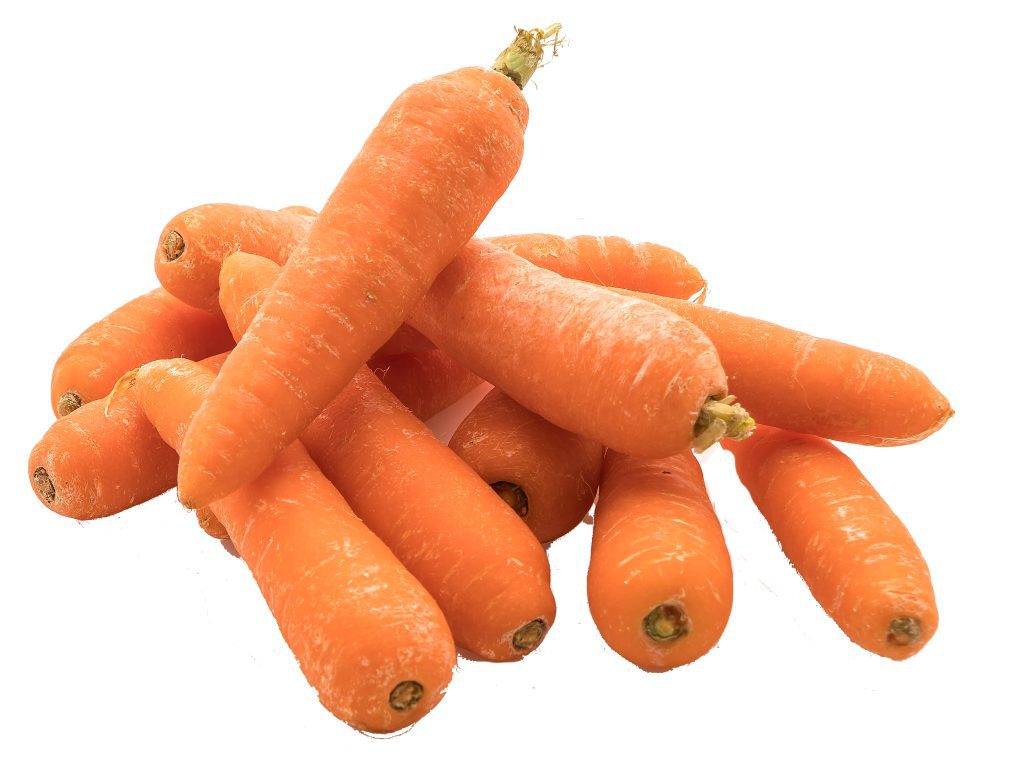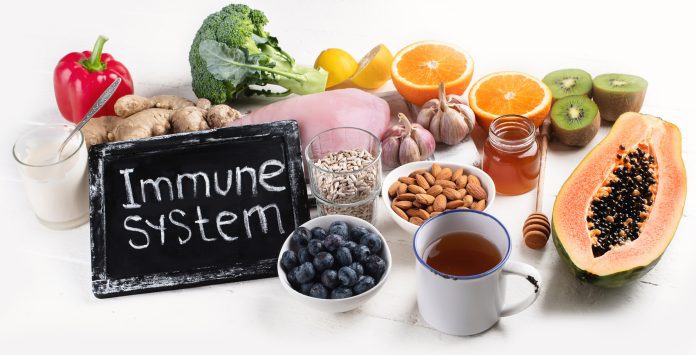Introduction
Binging on multivitamins and supplements does not keep your immune system going. However, scientific evidence shows how the best immune-boosting foods help fight against infections and diseases. Therefore, a smart option is to feed on excellent and healthy food choices that incorporate major immune system boosters and antioxidants. Grabbing vitamin supplements is an unhealthy option for fighting colds, diseases, and infections.
People have regularly visited their local grocery stores for good food sources that boost our immune system instead of swallowing unnecessary vitamins and supplements. Even in this woke generation, treating yourself to nutritious food comes first.

Healthy Eating Is An Everyday Thing
Feeding well is not ideal for a particular period like winter. And your daily feeding pattern should incorporate these 18 best immune-boosting foods:

For nutrient-giving sake, almonds are a big deal. Among all nuts, almonds are packed with healthy and essential fats that allow them to burn easily. There are rich in Vitamin E and have a high content of protein, complex carbohydrates, and also Vitamin B.
Research over the years has revealed that almonds contain high immune-boosting properties that help in boosting the immune system quickly. They are also a rich source of Vitamin E, which serves as an antioxidant. Hence, it is important to focus on almond skin as they are vital to many enzymes in the immune system.
Almond greatly serves nutrients to the body. One ounce of almond contains:
- 6 grams of protein
- 14 grams of fats
- 3.5 grams of fiber
- A higher portion of manganese and magnesium.
You can include almonds in your meals by having them as:
- Almond Protein Balls Snacks.
- Topping for salad, granola, and others.
- Butter for smoothies and toast.
- Putting it alongside yogurt.

Carrots are essential nutritious food you cannot afford to miss as carrots are among one of the best immune-boosting foods. They contain Vitamin C, which significantly boost the immune system and are a great source of antioxidants.
Antioxidants battle inflammation and harmful microbes in the body.
Another significant healthy property that comes to mind with carrots is the beta carotene. Beta-carotene is a potent antioxidant that increases disease-fighting cells and reduces inflammation. Carrots can be found almost everywhere and are quite inexpensive. What’s more, it’s perfectly sized for serving with a wide range of recipes.
They can be garnished into the preparation of:
- Your pasta and salad.
- Cakes and other pastries.
- Guess what; there is carrot soup!
- Snack on them in their raw forms to get the most from them.

Blueberries are not called “superfood” for the fun of it. They are arguably one of the highly nutritious berries. A cup serving contains 24% Vitamin C recommended for daily intake for boosting the immune system quickly. Blueberries can also give you 25% daily recommended manganese and 36% Vitamin K.
Blueberries are a richer source of antioxidants far beyond what other popular fruits and vegetables can produce. These fruits have nutrients like dietary fibre, potassium, and vitamin A. Another essential function of blueberries is reducing oxidation when it comes to bad cholesterol. This “superfood” boosts immunity and reduces the number of damaged cells.
Statistics show that blueberries have:
- 84% water content
- 0.7 grams of protein
- 10 sugar grams
- 0.3 grams of fats
- 2.4 grams of fiber
- 14.5 grams of carbohydrates.
You can have blueberries as part of your:
- Breakfast fast food like yogurt and oatmeal.
- Smoothies.
- Pancakes.
- Desserts.
4. The Citrus Family

Vitamin C is the most sought when it comes to cold. Vitamin C also helps to boost the immune system by increasing the volume of white cells produced. These white cells, in turn, fight acute infections.
The citrus family is broad and also standard around. All of the fruits in this branch are a great source of Vitamin C. Anyone you pick will give you surplus Vitamins to the body. The citrus family contains fruits like
- Lime
- Tangerine
- Clementine
- Orange
- Lemon
- Grapefruit
The body neither stores nor produces Vitamin C. Definitely, there is a need for daily intake of Vitamin C. The recommended intake for adult women is 75mg daily, while for adult men is 90mg each day. You can process any of these fruits into juice or suck them raw.
5. Turmeric

This yellow spice is as old as one can remember. Tumeric has, over the years, been an essential ingredient in the kitchen. Turmeric is versatile as an ingredient even in alternative medicines.
One way to boost your immune response is to use turmeric. Curcumin is an essential compound surplus in turmeric and has multiple benefits to the human body. It is an anti-inflammatory agent, and another benefit is that it also helps to boost brain health.
The spice is very easy to add to meals. You can turn them into
- Household juice.
- Snacks.
- Soup.
- Smoothies.
6. Spinach

Spinach is a very versatile healthy food and you can fit it into different recipes. Its nutritional value is high as it contains many vitamins ranging from Vitamin A to Vitamin C to folic acid to iron, calcium, and other nutrients. These nutrients contain high immune-boosting properties.
They are also essential for the muscular system, eye health, and respiratory system and fight against cancer.
Research clearly shows that enough intake of Vitamin C during flu season helps to ease the severe symptoms. It is also essential to note that the best way to retain spinach nutrients is to eat it raw or cook lightly. Light cooking spinach retains the bioavailability of some essential nutrients like vitamin E & A, fiber, calcium, iron, and protein.
7. Mushroom

It is entirely wrong to put all mushrooms into the same category. Not only do they have different varieties, but also the nutrients come in different quality. Mushrooms are a fantastic source of Zinc and vitamin D. These elements are an excellent boost for immunity and often release selenium, which boosts immunity and stimulates the production of T-cells; looking for a great combination of vitamins, minerals, and enzymes? Get high on mushrooms.
Mushroom produces reishi, maitake, and shitake, excellent immune-boosting elements. Different mushroom varieties have different fantastic health benefits.
A survey shows that 2 out of 10 men take up to 2 to 1 teaspoon, which lowers their blood triglycerides content.
Your mushroom can be:
- A substitute for meat in burgers and sausages.
- Different delicious sauce
- Breakfast egg dishes like an omelet and scrambled eggs.
8. Salmon

Get yourself a salmon and get high on Omega 3 fats. You can not ignore it when talking about immune-boosting foods. Salmon tops the list when talking about omega-3 fats. This fat, called omega 3 fats, promotes fast recovery and a healthy immune system.
Salmon gives vitamin B12 for the proper functioning of T-cell function, selenium for immunity, and vitamin D, which is very important in boosting the immune system. This fish remains super versatile in making dishes. Salmon can be fried, baked, or grilled. You can add it to your salad, pasta, egg dishes, and sauces.
9. Yogurts
The tag “live and active culture” is not for fun. Yogurts are a vast and great source of Vitamin D. What vitamin D does is increase the antibodies and regulate the immune system against diseases. Yogurts contain a few essential vitamins and protein.
With yogurt, you happily consume good and natural organisms that fight against harmful bacteria and infections caused by viruses. You get healthy probiotics which are essential for your health. Yogurts are very easy to add to daily meals. Add yogurts to your:
- Smoothies
- (Yogurt) parfait
- Salad dressing.
10. Brocolli
This delicious and vitamin-packed food is essential in boosting immunity. BROCOLLI covers a lot of vitamins like vitamin C, E, K, and A. It is also a superb supplier of minerals, folic acid, potassium, magnesium, and another wide variety of antioxidants.
The presence of antioxidants and vitamin C in broccoli help to eliminate harmful free radicals, prevent infections and sickness, and support the immune system. Eating broccoli also helps prevent cold/flu. You can have broccoli as:
- A delicious raw broccoli salad
- Side dishes or dressing
- An ingredient in stir-fries.
11. Ginger
Here comes another healing ingredient. Ginger tea, over the years, has been a proven home remedy for treating sore throat and colds. Do you want to reduce cholesterol too? You can safely turn to ginger. It eases period pain and improves the general health of both the brain and heart.
It is important not to overlook that ginger helps reduce various illnesses. This is possible due to some antibacterials and anti-inflammatory properties in it. You can use ginger to fasten digestion processes and cure bloating and stomach pain. You can have ginger in:
- Tea /energy shots
- Juices and smoothies
- Flavoring soup
- Snacks as in ginger chip.
12. Garlic
These popular bad boys bring more than zing to your food. It is also an essential and common kitchen spice. Garlic contains chemicals called allicin. Fresh garlic contains antibacterials, antifungals as wellas antiviral compounds.
Ginger is also an excellent ingredient for lowering blood pressure and works against hardened arteries. To get the best from your garlic:
- The doctor recommends you eat at least 2 cloves per meal. The more garlic, the healthier you are. It does not get too much.
- Slicing and crushing the garlic increase the allicin content.
Garlic is very versatile. It can perfectly sit as a spice for all dishes.
13. Red Bell Pepper

Apart from carrots, another source of beta carotene is the red bell pepper which has great antioxidant properties. Red bell pepper reduces oxidative stress in the body and neutralizes free radicals due to antioxidants in it.
Red bell pepper is another overachiever of vitamin C. Citrus fruits might be considered a high source of Vitamin C. Still; it beats it hands down. You can find the Vitamin C present in citrus fruits in red bell pepper three times.
A half-cup portion of red bell pepper contains 150% approved vitamin C for the day. A week must not go without getting yourself high on red bell pepper. You can have them in:
- Soup and stew
- Dishes like beans
- Stir-fries
- Salad
14 Shellfish
When it comes to Zinc and boosting the immune system quickly, just be selfish with shellfish. Zinc helps in the development and proper functioning of the body’s immunity. Incorporate shellfish into your dish.
Zinc eases cold and other symptoms. To have an excellent inflammation process, Zinc is a better partner. Women’s daily approved intake is 8 milligrams. Men are to take 11 milligrams daily. You can find Zinc in:
- Oysters
- Crab
- Clams
- The popular lobster
- Mussel
15. Papaya
Another superstar when it comes to vitamin C is papaya. Just in our fruit, 244% of your daily recommended vitamin C is found in papaya. Papaya contains an anti-inflammatory enzyme called Papain.
The combination of vitamins and Papain helps lower cholesterol levels, have high immune-boosting properties, prevent cancer, and regulate blood sugar. Papaya could be baked and also put into smoothies recipes.
16. Sweet Potatoes
Sweet potatoes contain a lot you don’t want to miss. These guys are bubbling with plenty of vitamin C, fiber, and a healthy amount of minerals. For immunity’s sake, sweet potatoes have three unique antioxidants. There is beta carotene, anthocynanins, and chorlogenic acid.
Beta carotene, as well as vitamin C, aid in boosting the immune system. In a single potato, there is 120% of the daily required vitamin A. Vitamin A together with C is an intelligent choice for the body, skin, and general immunity. You can have them as:
- A whole meal.
- Pizza
- Side dishes
17. Pomegranate

Pomegranate is another essential food you should include in your meal plan. It contains 30% of vitamin C needed daily, and 37% of vitamin K. These vitamins help in cold/flu season, especially vitamin K. Pomegranate is very high in potassium.
Other vital nutrients include fiber and protein. It is important to note that pomegranate contains double potent plant ingredients. There is punic acid and also punicalagin.
Punic acid is a fatty acid that helps to lower bad cholesterol. It is present in pomegranate seeds. Punic acid also reduces the risk of heart attacks and failure.
Punicalagins are an antioxidant and anti-inflammation component. Pomegranate contains three times punicalagin found in green tea.
Recent statistics show that this round and red fruit contains:
- 3.3 grams of fats
- 4.7 grams of protein
- 234 calories
- 52gram of carb
- 11.3 grams of fiber
- 28.2 mg of calcium for bone formation.
18. Egg Yolks
Egg yolks are the yellowish inner part of boiled eggs. Selenium and Zinc are the main nutrients in egg yolks. These two nutrients fight microbes in the body. Selenium and Zinc keep the skin glowing and clear.
Conclusion
Another essential thing to note while planning our diet is knowing how all best immune-boosting foods work together. These nutritious foods mix as a variety. Also, eating healthy food alone does not guarantee a healthy immune system. Your lifestyle determines a lot. Lack of exercise and smoking can ruin the body system. Avoid stress and have enough sound sleep. All these measures would help the body’s immunity






Do you mind if I quote a couple of your articles as long asI provide credit and sources back to your website?My blog site is in the very same niche as yours and my users would certainly benefit from some of the information you present here.Please let me know if this okay with you. Thanks!